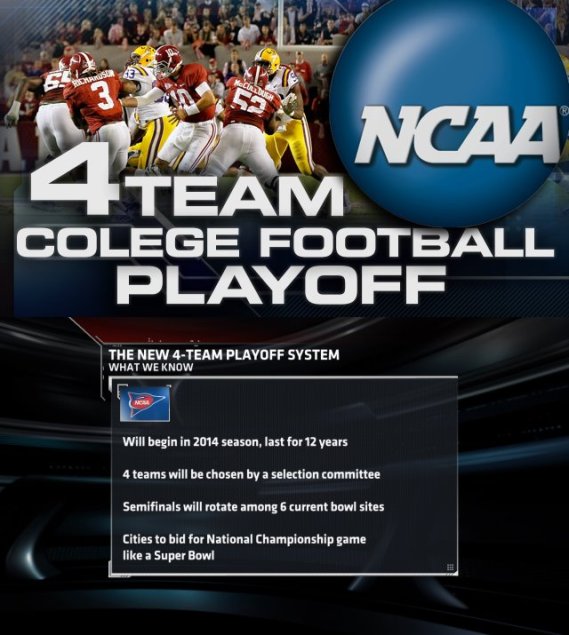WASHINGTON, D.C. — A four-team playoff for college football has been formally approved by a presidential oversight committee, a dramatic change for the sport that will begin in 2014 and continue through the 2025 season. The four teams will be chosen by a selection committee, the semifinals will be held at current bowl sites and the national championship game will be awarded to the highest bidder.
The 11 conference commissioners watched on Tuesday afternoon as Notre Dame athletic director Jack Swarbrick presented their proposal to a board of 12 university presidents at the Dupont Circle Hotel. In less than three hours, the group agreed upon a postseason that college football fans have been clamoring for years.
The group of presidents also endorsed a rotation of the semifinal games among six bowl sites and a rotation of the championship game among neutral sites. The semifinals either will be played on New Year’s Eve or New Year’s Day, and the national title game will be played on “Championship Monday,” the first Monday in January that is six or more days after the final semifinal game is played.
“A four-team playoff doesn’t go too far; it goes just the right amount,” said Virginia Tech president Charles Sterger, chair of the presidential oversight committee. “We are very pleased with this arrangement even though some issues & remain to be finalized.”
There will be three contract bowls — the Champions Bowl, which is a partnership between the Big 12 and SEC, the Rose Bowl, which has a longstanding tradition between the Big Ten and Pac 12, and a bowl to be determined for the ACC, which is likely to continue its partnership with the Orange Bowl.
“In terms of our contract bowl, and our New Year’s Day tie-in, we expect to have an announcement on that jointly in the very near future,” Swofford said.
The three other bowls, called “access bowls,” have yet to be determined, but the decision will force the Sugar Bowl and Fiesta Bowl to become bidders.
Tuesday’s decision possibly could squeeze the Big East out of the postseason, as its champion is no longer guaranteed a spot in one of the six major bowls. The “automatic qualifiers” label also will disappear in the new system and those programs will have no guaranteed access to the new structure. Big 12 commissioner Bob Bowlsby called it an “open marketplace for all schools.”
Also not involved in the automatic postseason picture is the Mountain West Conference, which did not receive a waiver to automatically qualify for the next two years.
Football Bowl Association executive director Wright Waters said in a statement: “Today is the beginning of an exciting time in the future of college football and we are committed to continuing the rich tradition of the bowls.”
The championship game will be managed by the conferences and will not be branded as a bowl game. The presidents also announced the creation of a selection committee that will rank the teams to play in the playoff, “giving all the teams an equal opportunity to participate.” The committee will consider win-loss record, strength of schedule, head-to-head results and whether a team is a conference champion.
The two main topics that still need further discussion are how teams will be selected and how revenue will be distributed. The commissioners have agreed in principle as to how the revenue will be divided, according to Big Ten commissioner Jim Delany, but that has not been made public yet. The commissioners also still need to decide a name for the playoff.
The decision is subject to passage of appropriate legislation by the NCAA Board of Directors to permit the two semifinal winners to play an additional postseason game.
ACC commissioner John Swofford called it “a milestone” for college football.
“The access for conferences throughout the FBS is going to be better in this system than the current system,” he said. “That’s an important part of this. But you have to play your way in. That’s a plus.”
***** Here are a couple of links that talk about it more. I can say that I’m excited for this!!! *****
***** http://www.youtube.com/watch?v=PSYFdm6oBU4 *****

